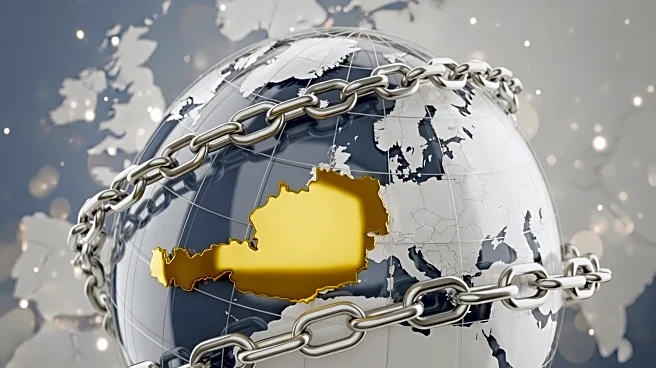What's Happening?
Austria has announced its support for the European Union's latest sanctions package against Russia, reversing its previous position and removing a significant obstacle ahead of a crucial vote. The EU foreign
ministers are scheduled to meet in Luxembourg to finalize the bloc's 19th sanctions package in response to Russia's invasion of Ukraine. Austria's initial resistance was linked to demands for the EU to unfreeze certain Russian assets to compensate Austria's Raiffeisen Bank International for penalties imposed by Russia. However, this demand was not supported by other EU member states, and the sanctions package requires unanimous approval from all 27 EU countries. The proposed sanctions include various energy and financial measures, notably advancing the ban on Russian liquefied natural gas to January 1, 2027, from the previously planned date of January 1, 2028.
Why It's Important?
Austria's decision to back the sanctions package is pivotal for the EU's unified stance against Russia, as unanimity among member states is essential for the sanctions to be enacted. This development underscores the EU's commitment to maintaining pressure on Russia amid ongoing geopolitical tensions. The sanctions, particularly the accelerated ban on Russian liquefied natural gas, could have significant implications for European energy markets and the broader economic landscape. By aligning with the EU's collective strategy, Austria helps ensure the bloc's cohesive response to Russia's actions, potentially influencing diplomatic relations and economic policies within the region.
What's Next?
The EU foreign ministers' meeting in Luxembourg will be a critical juncture for the finalization of the sanctions package. Slovakia, which has also expressed reservations, may receive a letter from the European Commission addressing its concerns, potentially smoothing the path for unanimous approval. The outcome of this meeting will determine the immediate future of EU-Russia relations and could set a precedent for how the EU handles similar geopolitical challenges. Stakeholders, including European energy companies and financial institutions, will be closely monitoring the situation to assess the impact on their operations and strategic planning.










